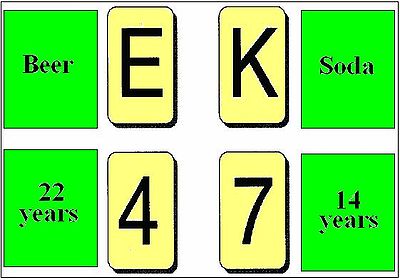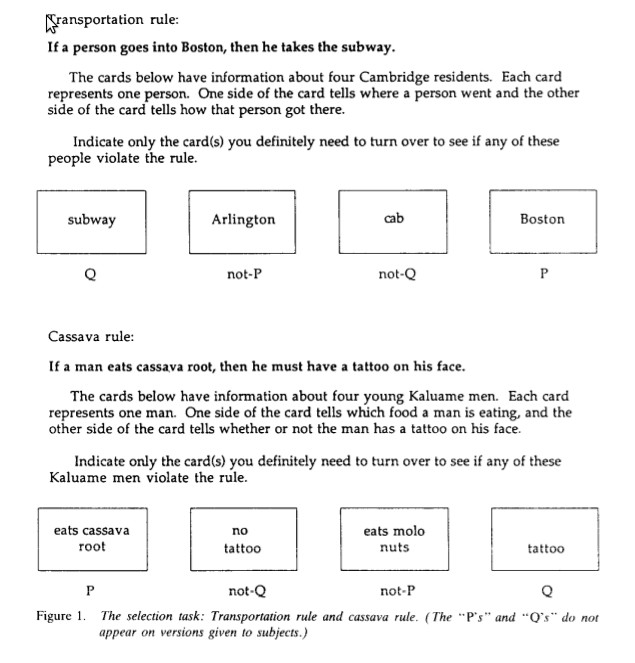
The Wason Selection Task pertains to the psychology of deductive reasoning. In this task, subjects are asked to verify a conditional rule, "If P, then Q". They are given four cards, randomly arranged, each having a version of P(P, not P) and Q(Q, not Q) on both sides. Each of the four faces corresponds to the four classes: P, Q, not P, not Q. The task is to deduce the minimum number of cards one needs to turn over to verify the rule. The correct answer would be two, since we only need to turn over the cards labelled P and not Q. Its found that when abstract meanings are assigned to P and Q(for eg: If P is a vowel, Q is an even number), the percentage of correct answers is usually low. But, when real-world items are used in place, as used in the beer/drinking-age problem by Griggs and Cox, 1992, performance increases. Here, the cards were labelled beer, soda, 22 years, 14 years; the rule was stated as "If one drinks beer, he/she must be atleast 19 years of age".

The Social Contract Theory was proposed by Cosmides in her influential paper in 1992. The theory posits a modular and evolutionary view of human reasoning[2]. Modular in the sense, that it only talks about human reasoning in the domain of social contracts, it is not domain-general. According to Cosmides, a social contract relates perceived benefits to perceived costs, expressing an exchange in which an individual is required to pay a cost (or meet a requirement) to an individual (or group) in order to be eligible to receive a benefit from that individual (or group). Cheating is the failure to pay a cost to which one has obligated oneself by accepting a benefit, and without which the other person would not have agreed to provide the benefit. [2]
It is evolutionary in the sense, in that it puts forward the view that humans have spent the major share of their time on earth as hunters and gatherers. In those times, respecting such social contracts, and detecting cheaters was the key to survival. Consequently, a set of cheating-detection reasoning procedures must have developed. Due to the evolutionary history of such procedures, they are bound to be with us even today and must influence our daily reasoning techniques too.
The two selection tasks used by Cosmides(study done on Harvard students):
Context story: There exists a tribe, Kaluame. Among them, married men have tattoos on their faces. The cassava root is a powerful aphrodisiac. The elders of the tribe have established the rule, since they strongly discourage sexual relations between unmarried people. Men, however, will try to cheat. You are a guard, who must check if the rule is violated. Each card, here represents a kaluame man. Check to see if the rule is violated.[2]

The transportation rule does not qualify as a social contract. No party is cheated, if the rule gets violated. On the other hand, the cassava task does have the form of a social contract. The benefit here, is the cassava root and the cost(more of a requirement), tattoo on the face(indicating marriage, as in the context story). The SC theory then predicts a higher success rate in the Cassava task than in the Transportation task. The results concluded 30-40% success rate in the transportation task, and 75% in the cassava task.
The SC theory posits that when a social contract reasoning problem is to solved, the cheater-detection algorithm kicks in. In so far, it does not distinguish between the two. All it really says is that whenever there is such a problem, the algo always comes in. Cosmides is mum on the distinction between the two. "For instance, we understand her as saying that for the social contract algorithms to operate there must be both a rule having the characteristic structure of a social contract and a cheater-detection algorithm (1989, pp. 223-230). But elsewhere, one can under-stand her as saying that only the former is sufficient: Thus, for social contract theory, the major determinant of responses is whether a rule is a social contract or descriptive" [2]
To determine, which is the crucial background process here, whether it is sufficient for a problem to be a social contract problem or the cheating-detection algorithm be activated, a battery of tests have been prepared. In addition, Cosmides' findings will also be replicated.
Tests will be performed on subjects, who are to be institute students. Each selection task shall consist of a rule, an instruction and a context story. The rules and instructions in each task are of the same form as in the Wason task(conditional rule: "If P, then Q" and pick the least number of cards to verify the rule). The context stories have been take from Cosmides(1989) for the first two tasks, and from Gigerenzer & Hug(1992). There will be 6 rules, with each having 2 versions making a total of 12 selection tasks. There will be two versions of the test, each containing only one of the versions of the rule. The top half of the accompanying figure(from Gigerenzer's paper) lists the tasks and their versions.

As an example, here is the Overnight selection task by Gigerenzer.
References: